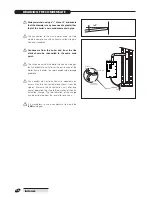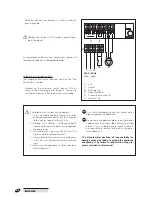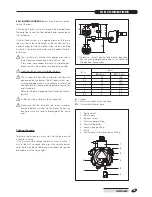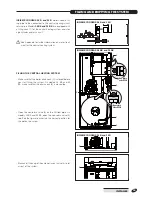
INSTALLER
21
WATER IN CENTRAL HEATING SYSTEMS:
INSTRUCTIONS FOR THE DESIGN, INSTALLATION AND MANAGEMENT OF CENTRAL HEATING SYSTEMS
1. Chemical and physical characteristics of water
The chemical and physical characteristics of water used in central heating systems must conform to the requirements of
EN 14868 standard and to the following tables:
(*) values for water in system after 8 weeks of functioning
General note on water used to top up systems:
- If softened water is used to top up a system, 8 weeks of functioning after topping up, verify that the water in the system
respects the above limits, in particular for electrical conductivity.
- This check is not necessary if demineralised water is used to top up the system.
STEEL BOILERS
with furnace power < 150 kW
Water used for
first filling
Water with system
operating (*)
pH
6-8
7,5-9,5
Hardness
°fH
< 10
< 10
Electrical
conductivity μS/cm
< 150
Chlorides
mg/l
< 20
Sulphides
mg/l
< 20
Nitrides
mg/l
< 20
Iron
mg/l
< 0,5
STEEL BOILERS
with furnace power > 150 kW
Water used for
first filling
Water with system
operating (*)
pH
6-8
7,5-9,5
Hardness
°fH
< 5
< 5
Electrical
conductivity μS/cm
< 100
Chlorides
mg/l
< 10
Sulphides
mg/l
< 10
Nitrides
mg/l
< 10
Iron
mg/l
< 0,5
2. Central heating systems
b
Do not use automatic filling devices to add water to central heating systems. Use a manual device instead and
record top-ups in the system service book.
b
If a system comprises a number of boilers, when that system is first put into service, make sure that all the boilers
function simultaneously or on a short interval rotation basis in order to evenly distribute initial limescale deposits.
b
When you finish installing a system, always flush it out to remove installation residues.
b
Water used to fill a system for the first time and water used to top it up must always be filtered (using synthetic or
metal mesh filters with a filtration rating of no less than 50 microns) to prevent sludge from forming and triggering
deposit corrosion.
b
Before re-filling an existing system, clean and flush it out thoroughly. Only fill the boiler after the central heating
circuit has been thoroughly flushed out.
2.1 New central heating systems
Initial filling of the system must be performed slowly. In theory, once filled and bled of all air, a heating circuit should not
need topping up.
Systems should also be operated at maximum working temperature the first time they are started up, in order to facilitate
de-aeration. (Gas is not released from the water at low temperatures.)
















































